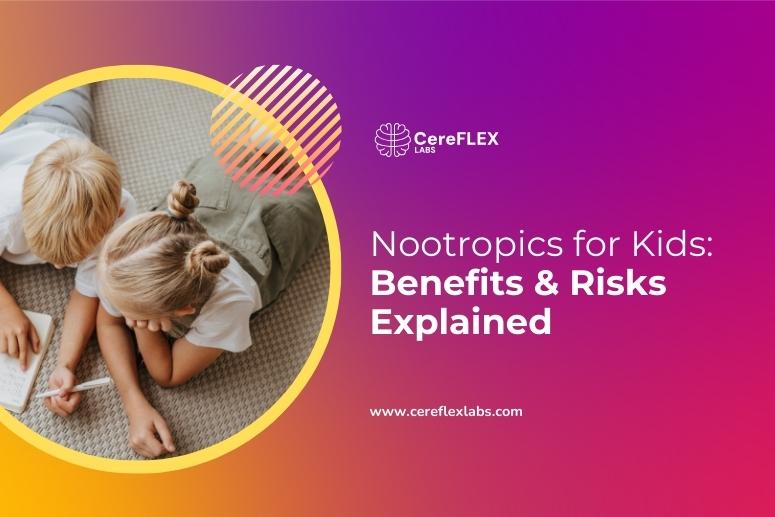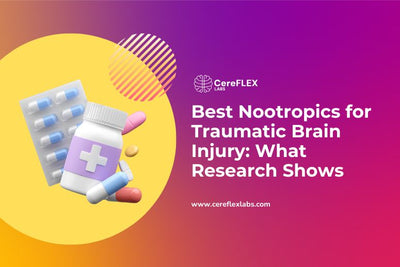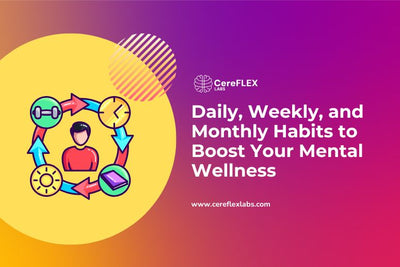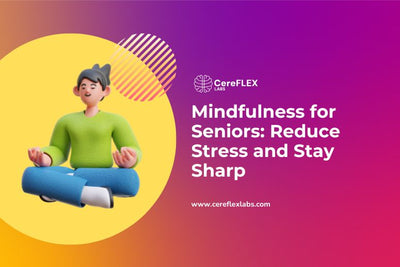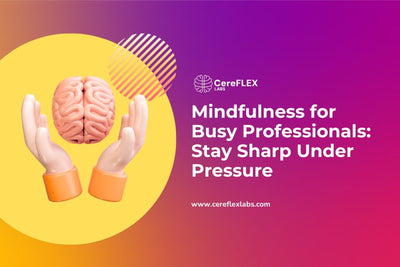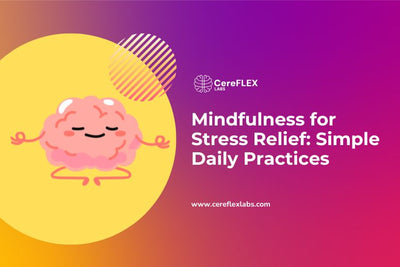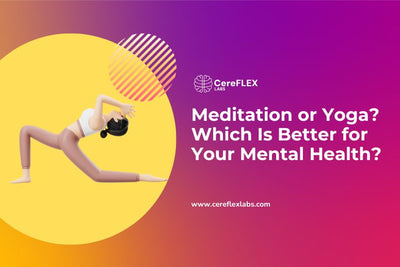As a parent, you want the best for your child—especially when it comes to children's cognitive health and academic performance. With growing interest in nootropics—supplements designed to enhance memory, focus, and learning—many parents are wondering whether these products can genuinely support brain development.
But with so many options available, how can you be sure they’re safe and effective for children? Do these cognitive supplements truly work, or do the potential risks outweigh the benefits?
This guide will explore what the science says about nootropics, address safety concerns and expert opinions, and help you make an informed decision about supporting your child’s brain health.
The Safety of Nootropics for Kids
The safety of nootropics for children remains uncertain, as most studies focus on adults. Research on kids is limited, small-scale, and short-term, making it unclear how these supplements affect brain development. Due to ethical concerns, long-term studies are lacking, and a substance safe for adults may not be suitable for children.
Parents should be cautious about products claiming to enhance focus and brain function, as no solid scientific evidence supports these claims for kids. Experts, including pediatricians and cognitive specialists, recommend consulting a doctor before introducing nootropics. Some ingredients—like those in multivitamins—may be safe, but others could pose risks depending on age, health status, and conditions like ADHD.
In Canada, nootropics are not specifically regulated for children. While Health Canada oversees dietary supplements, it does not assess the safety of nootropic products for minors. This leaves parents responsible for evaluating risks before use.
While nootropics may seem appealing for cognitive enhancement, their long-term effects remain unknown. Prioritizing a child’s overall well-being and seeking expert guidance is essential.
To better understand these concerns, let’s explore what nootropics are and how they work.

What are nootropics?
Nootropics, or brain supplements, are substances that support memory, focus, and learning. They are used to enhance cognitive performance, particularly during tasks that require attention and mental clarity.
These compounds work by influencing brain chemicals, hormones, and blood flow, helping to improve mental sharpness and overall brain function.
Common Uses of Nootropics
-
Memory – Supports information storage and recall.
-
Focus – Enhances concentration and attention.
-
Learning – Aids in processing and absorbing new information.
- Mental Clarity – Reduces confusion and promotes clear thinking.
Common Nootropic Ingredients
-
Caffeine – A stimulant that boosts alertness and focus.
-
Omega-3 Fatty Acids – Healthy fats that support brain health, memory, and mood.
-
Ginkgo Biloba – A plant extract believed to improve blood flow to the brain, aiding cognitive function.
- Bacopa monnieri – A traditional herb known for enhancing memory and learning.
The term "nootropic" was first used in the 1970s by Romanian chemist Dr. Corneliu Giurgea, who described these compounds as substances that enhance cognitive function without harmful side effects. Today, nootropics are widely used in supplements designed to support brain health and performance.
How do nootropics work?
Nootropics naturally enhance brain function by improving energy production, neurotransmitter balance, stress resistance, and circulation. Unlike synthetic stimulants, they provide lasting mental clarity and focus without sudden crashes.
Improving Mitochondrial Efficiency
Mitochondria—often called the energy factories of cells—produce ATP, the body’s main energy source. Nootropics help optimize mitochondrial function by reducing oxidative stress, improving nutrient transport, and maintaining cell structure. This leads to better mental and physical energy.
Balancing Neurotransmitters
Neurotransmitters like dopamine, serotonin, and GABA regulate mood, focus, and relaxation. Nootropics help maintain optimal levels, supporting better attention, memory, and emotional balance.
Increasing Stress Resistance
Chronic stress depletes brain energy and impairs cognitive function. Certain nootropics act as adaptogens, helping the body manage stress more efficiently. This results in improved concentration, memory, and mental resilience.
Enhancing Blood Flow to the Brain
Oxygen and glucose are essential for brain energy and function. Nootropics that promote circulation help deliver these nutrients more efficiently, reducing mental fatigue and boosting cognitive performance.
So are Nootropics safe for children? While adults may benefit from nootropics, children’s brains develop differently and may respond unpredictably. Potential risks include overstimulation, hormonal imbalances, and unknown long-term effects. Due to the lack of research on children, parents should exercise caution when considering nootropics for kids.
What are the side effects of nootropics in children?
Nootropics may cause side effects in children, especially since their brains are still developing. While research is limited, potential risks include:

Brain Fog
Brain fog refers to reduced mental clarity, focus, and energy. Some nootropics increase cognitive demands, which may overwhelm a child’s developing brain, leading to difficulty concentrating and sluggish thinking.
Headache
Headaches are a common side effect of nootropics, as they influence brain chemicals and circulation. Improper dosing, low-quality formulations, or excessive use may worsen headaches. However, certain nootropics—when used correctly—may help relieve them.
Digestive Discomfort
Some nootropics, particularly herbal extracts like Ginkgo Biloba and Omega-3 fatty acids, can irritate the digestive system, leading to stomach pain, bloating, or diarrhea. These effects may be more pronounced in children.
Insomnia
Nootropics that contain stimulants like caffeine can disrupt sleep patterns, making it harder for children to fall asleep or stay asleep. Poor sleep can lead to fatigue, irritability, and reduced cognitive function the next day.
Long-Term Risks
Impact on Developing Brains: Children’s brains are still developing, and the long-term effects of nootropics remain unknown. Altering brain chemistry too early may affect cognitive growth, emotional regulation, or natural learning processes.
Dependency: Certain nootropics—especially stimulants—may create a psychological reliance in children. If they depend on supplements for focus or performance, they may struggle to function without them, leading to long-term dependency issues.
Alternatives to Nootropics
While some parents explore natural supplements for kids' brain health, lifestyle changes remain the safest and most effective way to support cognitive function. Here are key habits that promote brain health:
Balanced Diet
Nutritious foods provide essential vitamins, antioxidants, and healthy fats that support learning and memory. Omega-3 fatty acids (found in fish, nuts, and seeds) boost cognitive function, while Vitamin D (from fortified foods or sunlight) helps regulate mood and brain development.
Regular Exercise
Physical activity increases blood flow to the brain, enhances growth factors, and improves memory and concentration. Encourage outdoor play, sports, or simple activities like walking and biking for lasting cognitive benefits.
Sufficient Sleep
Adequate sleep is essential for memory retention and emotional regulation. Depending on age, children need 9-12 hours of sleep per night to maintain optimal brain function. A consistent bedtime routine improves focus and learning.
Mindfulness and Relaxation Techniques
Practices like meditation, deep breathing, and yoga help lower stress, improve focus, and support emotional well-being. Teaching mindfulness techniques can enhance cognitive performance by promoting mental clarity and resilience.
What Parents Should Consider
Before giving nootropics to your child, consider these key factors:
-
Age Suitability: Children's brains are still developing, and nootropics may affect them differently than adults. Always check if a product is age-appropriate.
-
Potential Risks & Side Effects: Nootropics can cause anxiety, sleep disturbances, or digestive issues. Their long-term effects on brain development remain unknown.
-
Health Conditions & Medications: If your child has existing health concerns or takes medication, certain nootropics—especially stimulants—may cause stronger reactions.
-
Consult a Pediatrician: Always seek professional advice before introducing any cognitive supplement to ensure it is safe and appropriate.
While cognitive enhancers may seem appealing, prioritizing a balanced approach that supports physical, emotional, and cognitive well-being is the safest choice.
Conclusion
Nootropics for children may seem like an easy way to boost brain performance, but their benefits remain unproven, and potential risks—especially long-term effects—are unclear. Given the limited research, parents should prioritize safer, natural alternatives like a balanced diet, regular exercise, and quality sleep, all of which are essential for cognitive health.
Before considering nootropics, consult a pediatrician, assess your child’s unique needs, and ensure any supplement is age-appropriate and safe. A science-backed approach that supports healthy habits remains the best way to nurture brain development and long-term well-being.
FAQs
1. Are brain supplements safe for children?
Most brain supplements for children lack long-term research, making their safety uncertain. Parents should consult a pediatrician before use.
2. Can kids take memory supplements?
Some vitamins, like Omega-3s and B vitamins, may support brain health, but not all memory supplements are safe for children. A pediatrician can determine what’s appropriate.
3. Can children use nootropics for ADHD?
Some nootropics may help with focus, but their safety and effectiveness in children remain unproven. They should only be used under medical supervision.
